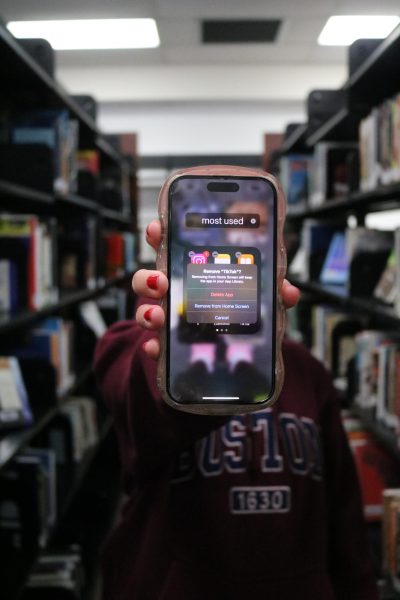Young Americans for Freedom chapter starts in Libertyville
Young Americans for Freedom (YAF) is a new conservative club at Libertyville High School, promoting individual freedom, a strong national defense, free enterprise and other traditional values.
A new Young Americans for Freedom club started in December, spearheaded by four juniors.
Juniors Chris Mulligan, Ryan Patterson, Matt Stokovich and Colin Watson began the Libertyville chapter affiliated with Young America’s Foundation (YAF), a conservative youth organization.
The national organization was started by William F. Buckley Jr. in 1960 and has since become one of the nation’s leading conservative leadership foundations, according to YAF. Ronald Reagan became an influential leader of this organization and after being elected president in 1980, he hosted an annual National Conservative Student Conference in the White House.
“In 2011, Young America’s Foundation unified with Young Americans for Freedom, which serves as the Foundation’s chapter affiliate on college and high school campuses across the country,” explained the YAF website.
YAF promotes traditional conservative beliefs: “We think that the government should be one that is small; it should allow for the freedoms of everyone. Liberties should be protected by the government and the U.S. should take an America First foreign policy approach. And we’re super pro-capitalism,” Mulligan said.
Mulligan said his goal in bringing the YAF chapter to LHS is to inspire political conversations and provide students of any political ideology with a space to respectfully debate politics. Seventeen LHS students attended the first meeting, which was held last month.
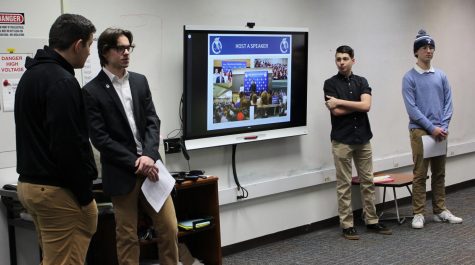
Juniors Chris Mulligan, Ryan Patterson, Matt Stokovich and Colin Watson initiated the club. The leaders said they plan to have grade representatives so the YAF club reflects the beliefs of all grade levels at LHS.
Mr. Brian Voss, the supervisor of the Social Studies Department, is the faculty advisor for this new club. Mulligan approached him at the beginning of the first semester to initiate conversation about what this club might look like.
Mulligan discussed his intentions for this club with Mr. Voss and together, they came to the conclusion that YAF best aligned with Mulligan’s beliefs and goals for this club. Additionally, having a tie to a national organization provides the Libertyville chapter with funding they may not otherwise receive.
One goal Mulligan has for LHS’s chapter of YAF is to organize a chapter-wide trip to a national conference. Mulligan hopes that this exposure will encourage club members to be more confident in their conservative beliefs and ultimately spread conservatism throughout the school and community, Mulligan said in a text.
He emphasized the confidence he hopes club members will develop: “A lot of people are scared to share their opinions, and I hope that the experience of a conference will give them the strength of being able to share their opinions.“
YAF member PJ Liphardt, a junior, has the same goal, sharing over email that he hopes to become the junior class representative. YAF, he hopes, will provide him with the opportunity to be a leader within the community.
The YAF chapter at the College of Lake County is led by Rob Corn. Corn has been an influential part in Mulligan’s attempts to bring the club to LHS: he’s shared his wisdom on creating an effective movement and tips to successfully and respectfully promote their beliefs.
Corn spoke at the LHS chapter’s first meeting and encouraged students to recreate the environment his group has created at CLC. According to Corn, their chapter is “one of the largest and most diverse groups on campus.”
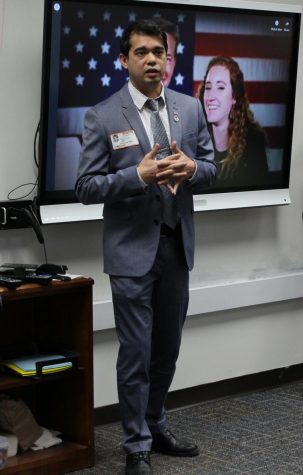
Rob Corn, a chairman of the College of Lake County’s YAF organization, was a guest speaker at the first meeting. LHS’s YAF club plans to host other speakers at their upcoming meetings.
The LHS chapter’s introduction has not been well-received by the entire LHS community, and some have shared concerns with the administration. One specific concern some students have is regarding a YAF-affiliated public figure’s anti-Muslim sentiments. Author and public speaker Robert Spencer is a self-professed Islamophobe who interprets the Quran as inciting violence, according to Spencer’s organization, Jihad Watch. Spencer has been a featured speaker at YAF conferences and his videos are featured on their website.
Mulligan addressed Spencer’s beliefs: “He’s not someone we agree with, but we can’t let one person represent the whole organization…we just don’t think he’s a bad enough person to withdraw affiliation [from YAF].”

Students who attended the club’s first meeting signed in on a table with brochures, books and stickers that align with the club’s beliefs.
After accusations arose over social media that the group was crypto-fascist — meaning that they secretly support fascism — the executive board decided to postpone their first meeting, which was initially scheduled for Dec. 4, until Dec. 11. They made this decision to ensure that they were prepared to address any pushback from students and to emphasize that this club is open to all students with all political ideologies to engage in respectful debate.
Mulligan responded to the club’s opposition: “We are not at all crypto-fascist. We don’t hate anybody; we’re open to anyone that wants to come. We have no hatred — we’re not white nationalist, we’re not fascist, we’re not any of that. We’re just people who have conservative-leaning beliefs.”
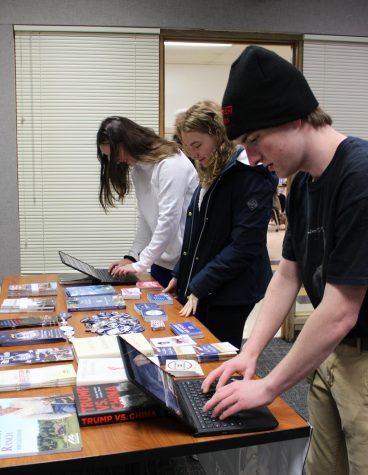
The YAF club will meet every other Wednesday at 7:45 before school in room 149.
Due to its political nature, the club cannot officially be sponsored by the school. However, a club doesn’t need to be school-sponsored to hold meetings on campus. Mulligan and his team have met all the criteria for forming a club at LHS, which enabled its introduction on a probationary period — something that every new club goes through before being named a permanent club.
Mr. Voss thinks that this group’s creation could lead to other groups for students to have healthy discussion surrounding political topics: “I hope a liberal group now in response comes out and says, ‘I want a liberal group,’” he said.
Liphardt agrees that the chapter provides LHS students with a valuable opportunity: “Whether you agree with what we stand for or not, it is important to have different viewpoints. They help us to grow stronger all around as a community,” he shared over email.
Mulligan made sure to emphasize that he is more than happy to discuss the club’s intentions with anyone who may disagree with their beliefs.
“If anyone [has] qualms against us, I welcome you with open arms to a meeting… I’m always open to having a conversation with anyone,” he said via text. “Also I can’t stress enough that anyone is allowed to come, regardless of political ideology.”



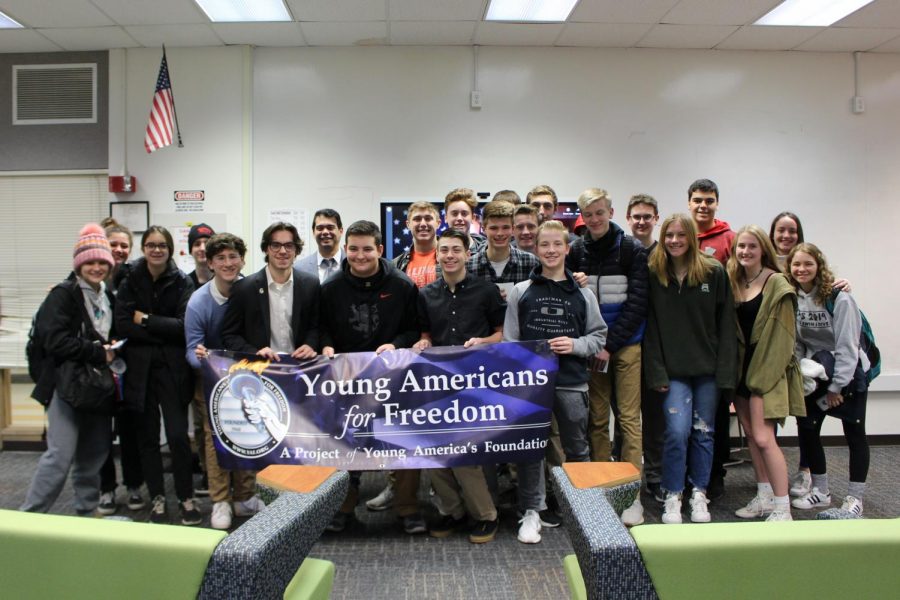
![Mr. Abullh Ali, manager/assistant, helps open Queen Yemeni Coffee in downtown Libertyville at 606 North Milwaukee Ave. With the help of employees such as manager and LHS senior Yousef Taha, they are able to bring the Yemeni and Ethiopian culture to Libertyville by using their Queen spices, cinnamon and cardamom in their drinks such as Adani Chai, which is inspired by Sheda, the Queen of Yemen and Ethiopia. “The history of our coffee [is] a long history and we believe that Yemen and Ethiopia started the coffee and we are bringing something unique to the community,” Mr. Ali said.](https://www.lhsdoi.com/wp-content/uploads/2025/04/Photo-1-600x400.jpg)


